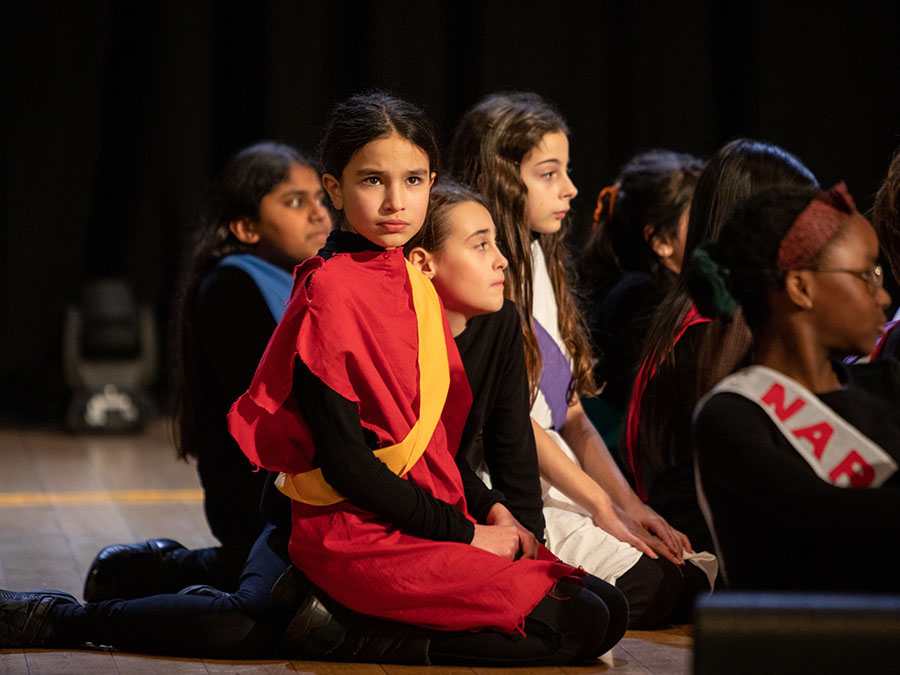How Coram Shakespeare Schools Foundation helped Ben overcome his stammer
'I have no other than a woman’s reason’ (Two Gentlemen of Verona, I. 2. 23)
Challenging Shakespeare on International Women’s Day
A friend asked me recently what I thought it was about Shakespeare that has given him his unique cultural status. It’s an interesting question. What is it that has elevated Shakespeare to such dizzying heights within the canon of English literature? What separates Shakespeare from the Jonsons, Kyds and Dekkers who wrote around the same time and place as him? Why (for that matter) are we Coram Shakespeare Schools Foundation, rather than Marlowe, Middleton or Marston Schools Foundation?
There were perhaps any number of answers I could have given, but what I said – slightly glibly, slightly provocatively – was: his women.
It’s a view that has echoed through hundreds of years of Shakespeare criticism. ‘Shakespeare was androgynous,’ Virginia Woolf wrote famously in her seminal essay on women and literature, A Room of One’s Own, in 1929, claiming for him a mind that ‘is resonant and porous; that […] transmits emotion without impediment; that […] is naturally creative, incandescent and undivided.’ She goes on to cite a handful of those famous Shakespearean women, who, she writes ‘have burnt like beacons’ - Cleopatra, Lady Macbeth, Cressida, Rosalind, Desdemona.
Many subsequent critics have also read Shakespeare this way. Juliet Dusinberre wrote in 1975:
The drama from 1590 to 1625 is feminist in sympathy […] Shakespeare’s feminism consists of more than a handful of high-born emancipated heroines: it lies rather in his scepticism about the nature of women. [...] He did not divide human nature into the masculine and the feminine, but observed in the individual woman or man an infinite variety of union between opposing impulses.
Maybe it’s because of this that women have produced, both onstage and behind the scenes, such compelling responses and re-imaginings of Shakespeare over the years. In some ways it seems incredible that modern women have found such possibility the plays of a man who wrote before women could vote or own property – but they have.
Sometimes this is through explorations of the women who ‘burn like beacons.’ Every generation brings their own perspectives, experiences and contexts to ask who these women – Ophelia, Titania, Goneril – are, and how we might see them anew. Increasingly, however, we also see Shakespeare productions that are not confined by gender at all - where women are Hamlets, Oberons and Lears too.
This is as true at Coram Shakespeare Schools Festival as it is on the professional stage. Every year during the Festival, we have the pleasure of seeing gender-blind, gender-swapped and all-female Shakespeare productions grace our stages up and down the country. Amongst the performances submitted as part of One Night of Shakespeare in 2020, I saw fantastic all-female performances of Twelfth Night, Macbeth and As You Like It, as well as mixed-gender productions where young women really made the roles of Prospero, Ariel, Baptista Minola and Macbeth (to name but a few) their own. In doing this, audiences are asked to look at Shakespeare's play with new eyes, to reconsider pre-conceived ideas about the relationships and power dynamics at work - and of course to appreciate the talents of the actresses and directors who bring these gender-swapped characters to life with such facility.
In 2012, when acclaimed Shakespearean actress (and Coram Shakespeare Schools Foundation patron!) Dame Harriet Walter starred in an all-female trilogy of Shakespeare plays, directed by Phyllida Lloyd at the Donmar Warehouse, there was scepticism about the commercial viability of such a venture. ‘People would just scoff at it,’ the Donmar Warehouse’s artistic director, Josie Rourke, told The Guardian in the 2018. The trilogy included Julius Caesar, Henry IV and The Tempest, with Walter playing Brutus, Henry IV and Prospero respectively, and was a triumphant success – it was even filmed for the National Theatre Live programme in order to be accessible to a wider audience. ‘The Shakespeare trilogy had a feminist mission, a social mission, an inclusivity mission, an education mission,’ said executive producer Kate Pakenham in the same 2018 interview, ‘[it] made the theatre richer in every way.’

Shortly before the pandemic forced the theatres closed, I caught the RSC’s gender-swapped
Some theatre-makers have made all-female Shakespeare a full-time occupation. Founded in 2012 by Ashlea Kaye, Michael Grady-Hall, Yaz Al-Shaater and Mariam Bell, the Smooth Faced Gentlemen are an all-female Shakespeare theatre company, who, in recent years, have staged plays like Othello, Titus Andronicus and Romeo & Juliet with all-female casts, to great effect.
‘We use the single gender convention as a lens to cast a new light on these well know plays, challenging audiences to take a fresh look at Shakespeare’s wonderful stories,’ they write in their mission statement. ‘We love playing with conventions and preconceptions by experimenting with new interpretations of characters and events.’
The Smooth Faced Gentlemen set themselves apart from other, more explicitly feminist endeavours, like the Donmar Warehouse trilogy:
[We] don’t set out to promote any overt political message, feminist or otherwise. We do all want to see equality in the arts, but we believe the individual preconceptions surrounding our company says more about the state of gender equality today than any mission statement. Our audience come to our work expecting to be affected by the absence of male actors. Our audience leave affected by the story, the interpretation, the staging, the pace, and the fresh take on Shakespeare’s wonderful tales. That’s our aim.
Maybe, ultimately, the question of what proto-feminist sympathies can be found in the text of Shakespeare’s plays is less interesting that the platform with which he has provided women since to practice and perform. At Coram Shakespeare Schools Foundation, our ethos has always been about using Shakespeare as a tool, as a catalyst for allowing discussion, fun and creativity to flow and flourish, and perhaps this is where he is most important for women specifically too.
If you want to celebrate with us this International Women’s Day, we’d love for you to share how you #ChooseToChallenge Shakespeare on social media with us – tag us or use the hashtag #ShakespeareSchools to make sure we’ll see!
And if you want to use one of our stages as a platform for the brilliant girls and young women at your school or drama group, head over to our website to find out more about the opportunities we’re offering this year. I’m always blown away by the bold, original performance, direction and production, unrestricted by traditional gender roles, that we see every year from the women we work with, and I truly can’t wait to see these young women take their talent, their power and their innovation out into the world and the future.

